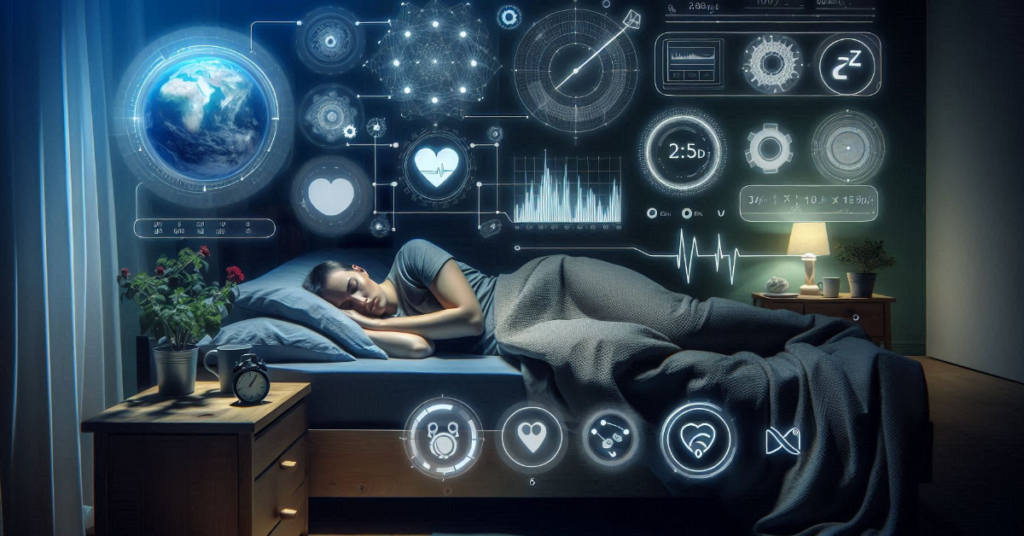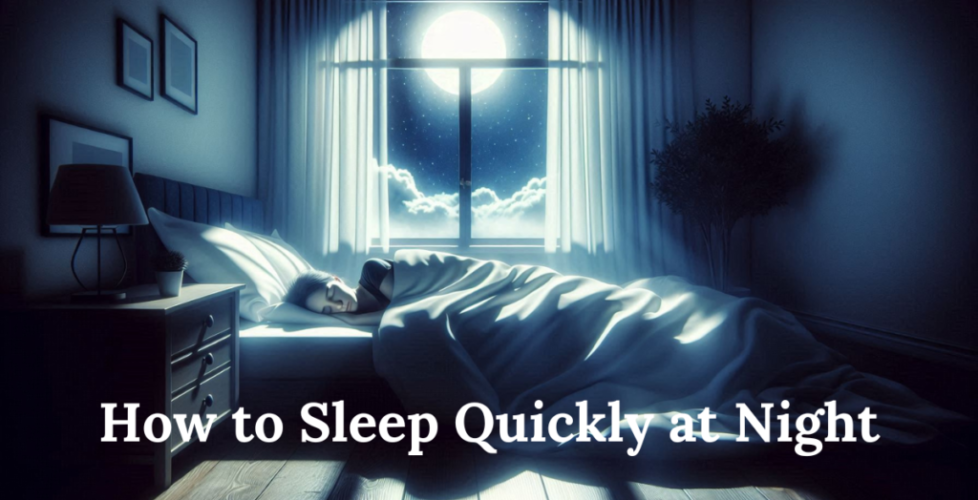How to Sleep Quickly at Night
Is it possible to get through your life without lying in bed and staring at the ceiling, wishing to fall asleep? A night of good rest is a must for our health. This sleep affects our mood, immune system, and overall well-being. Most people settle into a regular bedtime routine every day. But why is it important to know how to fall asleep faster? Rapid rest onset yields enhanced results. Your body needs restorative rest, and learning to fall asleep faster is crucial for your health.
Understanding Sleep Patterns
Knowing a little about respite is necessary to learn how to sleep faster. Our rest cycles alternate between REM and non-REM stages, lasting about 90 minutes. The non-REM stages denote the deep rest period when the body rejuvenates itself. Interference in these cycles can cause rest problems the next night. It makes it harder to rest. Circadian rhythms, our internal body timepieces, are also a critical factor in this. They determine the moment we awake and the moment we feel sleepy. This is the reason a consistent bedtime schedule is so important.
Creating the Perfect Sleep Environment
Your bedroom should be a sleep sanctuary. Begin by regulating the temperature; most recommend a starting temperature of 65°F (18°C). Another critical factor is darkness. The body releases a respite hormone, melatonin, in the dark. Thus, get a good blackout curtain or a rest mask. Another factor is noise. For instance, a slight sound can wake you up. One should use a white noise machine or earplugs to reduce noise levels in the room. Don’t neglect comfort. The mattress and pillow must support your body so you can rest.
Establishing a Bedtime Routine
Going to bed at the same time every day serves as a cue to the body to relax. Avoiding bedtime interruptions or keeping a fixed schedule helps. It lets your body set a natural habit, even on weekends. It’s also prohibited to do vigorous activities before bed. This includes watching TV, drinking tea or coffee, and using electronics. Sidestep screens for at least one hour before the mattress. The yellow light from phones, tablets, and computers disrupts melatonin, causing sleepless nights.
Also Read: How to Unarchive Your Instagram Stories: A Step-by-Step Guide
Diet and Sleep
What you eat and drink influences the quality of your rest. Foods such as almonds, turkey, and kiwi are sleep-friendly. They contain sleep-inducing elements such as tryptophan and melatonin. Caffeine and alcohol are harmful to your bedtime cycles. Caffeine holds on for hours in your system, so use it wisely and don’t drink it in the afternoon and evening. Acid may be a factor that makes you drowsy, at least at the beginning.
Exercise and Sleep

Regular physical activity is one of the best ways to ensure a good night’s rest. Exercise helps normalize our circadian rhythm and reduces stress, making rest easier. Exercise near bedtime hinders rest, as it spikes heart rate and temperature. Try to complete your exercise at least three hours before the mattress. Evening activities such as yoga or light stretching can also help. They can relax and unwind you.
Stress Management and Sleep
Stress is one of the most common reasons people struggle to fall asleep. When you’re worried, your body creates cortisol, a hormone that keeps you awake. Comprehending how to manage pressure is crucial for more suitable rest. Meditation and profound breathing can relax your mind and train your body for rest. Progressive muscle relaxation can also help. Another effective strategy is journaling. Write down your thoughts before bed. It can clear your mind of worries and help you drift off.
Using rest Aids Wisely
It’s tempting to reach for an over-the-counter rest aid. Use these products with restraint. Rest aids can help temporarily, but they don’t fix slumber problems and can cause dependence. Natural supplements, such as melatonin and valerian root, offer alternative solutions. Magnesium also provides an option, though prudent use is essential. If bedtime issues persist, it’s best to consult a doctor to rule out underlying health conditions.
Read: How to Become a Travel Nurse: Your Step-by-Step Guide
Mind Techniques for Falling Asleep Faster
Mental preparation is the secret to falling asleep quickly. The most used one is the 4-7-8 exercise technique. Hold for 4 seconds, then seven, and finally exhale for 8. This procedure decreases the heart rate and soothes the nervous system. Mantra and guided imagery are the big tools. Picture a serene place, e.g., a beach or a forest. They can divert you from the stressful situation. Another method is the Cognitive Shuffle—the vision of random, irrelevant words. Thus, your mind will be freed from the fixation of worries.
What to Do When You Can’t Rest
Sometimes, despite your best efforts, shuteye won’t come. If you’ve been in bed for over 20 minutes, get up. Do something relaxing instead of getting frustrated. Engage with a book, absorb soothing melodies, or execute gentle stretches. Sidestep turning on colourful lamps or doing anything too exciting. The key is to keep your mind calm and patient—stressing about not sleeping will make it harder to fall asleep.
The Role of Naps
Naps can be a double-edged sword. Napping for a short time can increase your energy and improve your mood. However, a long or too-late nap can interfere with nighttime rest. If you must nap, go for thirty or fewer minutes, and do not nap after three or in the evening. In addition to that, you can still reap the benefits of a nap without disturbing your rest schedule.
Understanding Sleep Disorders
For some, difficulty sleeping may indicate a more severe issue, like a slumber disorder. Slumber disorders like insomnia, rest apnea, and restless leg syndrome disrupt bedtime. If you suspect you have a slumber disorder, it’s essential to seek professional help. A rest specialist can diagnose and recommend treatments. These include lifestyle changes, therapy, or medical interventions.
Tracking Your Sleep

Tracking your rest can reveal patterns and areas for improvement. Many rest trackers and apps can track your rest. They can measure how long you rest and the stages of your rest cycle. Keeping a bedtime diary can track and help you adjust your bedtime habits. Knowing your bedtime data can help you improve your routine and boost your rest quality.
Myths and Facts About Sleep
More information regarding sleep needs to be provided. Many believe that watching TV in bed helps them relax. But the light from the screen can keep you awake. Another myth is that you can catch up on rest over the weekend. Lingering in bed helps restore energy but fails to erase rest debt. Separating fact from fiction is critical to improving your bedtime habits.
Conclusion
Body repair demands swift rest onset to achieve restoration. Create a sleep-conducive environment, set a bedtime routine, and alter lifestyle habits. Focus on finding what suits you best and making gradual adjustments.
FAQs
How long does it take to fall asleep?
Usually, falling asleep occurs within a 10-to-20-minute time frame. Deferring yoUr Regular Bedtime Routine or Environment Points Out an Issue.
Do some foods make you fall asleep quicker?
Foods rich in tryptophan, melatonin, and magnesium can facilitate slumber. Turkey, almonds, and kiwi are particularly rich in these nutrients.
Is it safe to rest with the TV on?
TV sleep is distracting and can be counterproductive. The blue light and noise kill your rest cycles.
How much is enough sleep for me to function optimally?
Most adults require 7 to 9 hours of rest to be healthy. Yet, the requirements can differ.
For Information: Explore, Learn, Grow: A Deep Dive Into Travel Education
